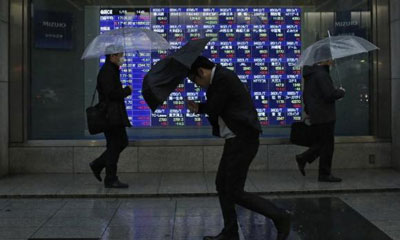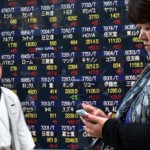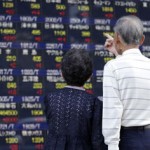Asian stock markets trade mixed; commodities weigh

Asian stocks trimmed losses Thursday as oil prices edged up from an over three month low, although the mood remained cautious ahead of key economic events overseas.
U.S. crude prices clawed back gains and was up 43 cents or 1.08 percent to $40 a barrel during Asian trading hours. The internationally traded Brent was also up 50 cents or 1.2 percent to $43 a barrel. U.S. oil prices had slid below $40 for the time since August overnight, dragging U.S. shares with them.
Investors will look to Vienna on Friday, where members of OPEC will meet to decide on oil production policies.
But Angus Nicholson, market analyst at spreadbetter IG, said in a note there was very little expectation the OPEC countries would reach any constructive outcome. OPEC, led by Saudi Arabia, has pursued a strategy of defending its market share by pumping out more oil even in the face of global oversupply, in the hope of forcing down the price to a point that higher-cost shale rivals halt output.
According to the International Energy Agency, world oil stockpiles are currently at a record high.
“Saudi Arabia, Iraq and Russia are still producing oil at record rates and there is little hope that this meeting will convince them to cut back, particularly given that Russia is not a member of OPEC so would need to be dealt with separately,” Nicholson wrote.
ASX extends losing run
Australian market closed down, weighed by lower commodities prices. The main ASX 200 index was down 23 points or 0.44 percent at 5,235.
Miners took a hit after iron ore prices fell to a 10-year low, hitting the $40 a tonne mark. Shares in Fortescue, BC Iron, and Mount Gibsonclosed down between 2.2 and 4 percent.
The country’s two biggest miners, Rio Tinto and BHP Billiton, also lost between 1.9 and 2.9 percent.
Gold miners closed mixed after spot gold fell 1.5 percent to $1,052 an ounce overnight. Fed chair Janet Yellen again hinted at an imminent rate hike when the Federal Open Market Committee meets again in mid-December.
Shares in Kingsgate fell by 8.77 percent while Alacer Gold was down 1.13 percent and Newcrest closed 0.18 percent lower.
Oil producers had a mixed session after U.S. crude futures fell below the $40 mark. Shares in Oil Search were down 2.17 percent andWoodside Petroleum saw losses of 3.8 percent.
Banking stocks ended mostly in negative territory as investors took cues from a poor finish in Wall Street.
Chinese market trade positive
The Shanghai Composite steadied in late morning trade, up 21 points or 0.59 percent at 3,558, following early volatility.
Speculation of additional stimulus from Beijing to prop up China’s slowing property market sent property and banking and finance shares soaring in late afternoon trade on Tuesday.
A survey released this morning showed a cooling in China’s services sector. The Caixin Purchasing Managers Index (PMI), a closely-watched gauge of nationwide business activity that focuses on smaller and medium-sized companies, dropped to 51.2 in November from 52 the month before. The official services PMI, which was out on Tuesday, showed an uptick to 53.6 from 53.1 in October. A reading above 50 implies growth.
The Shenzhen Composite was up 1.4 percent; the tech-heavy Chinextwas up 1.5 percent and the CSI 300 Index was up 0.38 percent.
Finance stocks traded mixed, with shares in Huatai Security and China Merchants gaining between 2 and 2.7 percent. Brokerages are still under investigation by Chinese regulators for short-selling and speculation in the lead-up to China’s mid-year market rout. Banks were back in the positive territory in the late morning session, with China Construction Bank seeing a jump of 3 percent and ICBC up by 2.1 percent.
Chinese energy stocks were also down on the back of lower oil prices.
Nikkei pares losses, trades flat in afternoon session
The Nikkei 225 traded flat in late afternoon trade, up by 18 points or 0.09 percent to 19,956, as investors remained cautious over Japan’s fragile economy.
Reuters reported that capital flows data showed foreign investors were net sellers of Japanese stocks last week, with a net 54.6 billion yen ($443 million) in shares sold.
On Wednesday, the Bank of Japan’s deputy governor Kikuo Iwata told business leaders in Okayama the BOJ was prepared to ease monetary policy again if tougher conditions in emerging markets stymied the uptrend in Japanese inflation, but he said that the central bank could keep policy unchanged at present because the risks from a further slowdown in emerging economies worsening was low in the near future.
“If the manifestation of such risk leads to a deterioration of the underlying trend in inflation, the Bank will make adjustments without hesitation,” he said.
Japanese blue chip companies were mostly down, as shares inMitsubishi Electric and Toshiba saw losses of 0.8 and 0.5 percent.
Shares in market heavyweight Fast Retailing pared some of the early losses and traded 1.82 percent lower.
Kospi down 1 percent
The South Korean market continued its losing run as investor confidence weighed by Wall Street and lower commodities prices. TheKospi index was 21 points or 1 percent down at 1989 in afternoon trade.
Revised data from the Bank of Korea showed the economy grew a seasonally adjusted 1.3 percent on-quarter between July and September.
Blue chip and tech shares traded lower. Shares in Samsung Electronicswas down 0.77 percent, steel manufacturer Posco was down 1.44 percent, while Hyundai Motor trimmed losses to trade flat.
The Korean won depreciated against the dollar, fetching 1168 won.
Overnight U.S. crude prices fell $1.91, or 4.6 percent, at $39.94 a barrel. Government data showed a tenth straight week of inventory build-up stateside, adding to worries over a supply glut.
The Fed also released its Beige Book, a report on business activities around the country, that noted a modest tightening in the labor market.
Investors were wary as they watched another mass shooting unfold, this time in San Bernardino, California, where gunmen opened fire at a social services agency, killing at least 14 people before fleeing.
The Dow Jones Industrial Average closed 159 points or 0.89 percent lower at 17,730; the S&P 500 was down 23 points or 1.1 percent at 2,080; and the Nasdaq closed 33 points or 0.64 percent lower at 5,123.
Source: CNBC – Asian stock markets trade mixed; commodities weigh





























